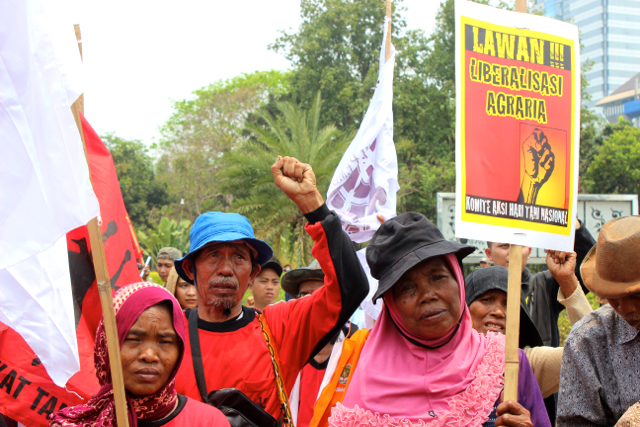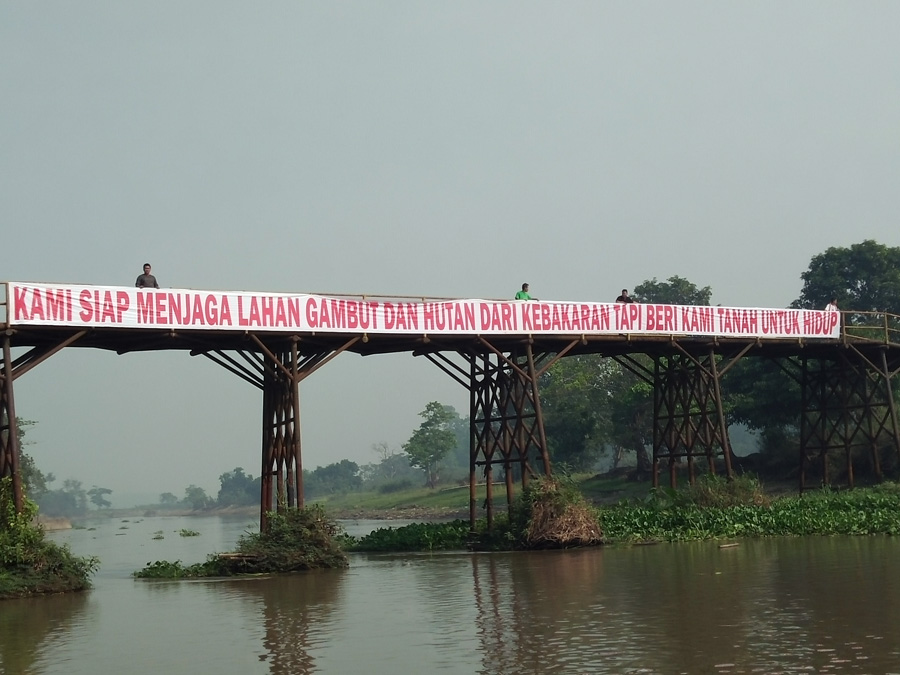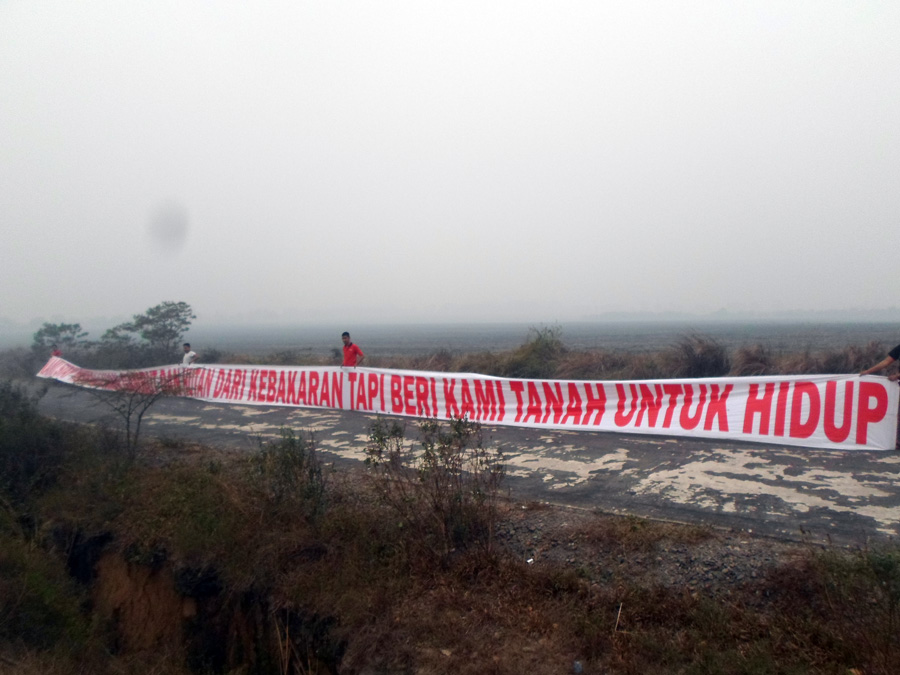- The haze crisis is serving as an occasion for Indonesian farmers who argue that companies bear prime responsibility for the agriculture fires raging across the country to demand greater land rigthts, promised by Jokowi when he ran for president last year.
- They demonstrated in Jakarta, Riau and South Sumatra last week, unfurling 50-meter-long banners expressed their readiness to protect peatlands and forests from fire.
- Some say a misguided perception among officials that local people are lazy has stood in the way of agrarian reform.
Farmers in South Sumatra, an epicenter of Indonesia’s haze crisis, unfurled banners last week expressing their readiness to protect forests and peatlands from fire – and calling for President Joko “Jokowi” Widodo to give them the land to so.
One banner was plastered to the side of a bridge. Others were set up in burned-out oil palm and sugarcane concessions, including one Jokowi recently visited. Stretching 50 meters, they read, “Kami siap menjaga lahan gambut dan hutan dari kebakaran tapi beri kami tanah untuk hidup” (We are ready to protect peatlands and forest from fire but give us land for living).
During his campaign, Jokowi promised to redistribute 9 million hectares, or about 5 percent of the national land base, to small farmers.
The actions in South Sumatra coincided with demonstrations elsewhere in the country for National Farmers Day on Monday last week.
In Jakarta, farmers from West and Central Java gathered outside the Presidential Palace to demand that Jokowi move forward with agrarian reform. In Riau, another haze epicenter, the People’s Alliance for Agrarian Reform (ARRA) demonstrated outside the province’s parliament, where protest coordinator Taufik Rahman said development based on extractive investments has been a failure.
“Farmers and the people are promised benefits from these investments; instead they become victims of corporations’ bad practices,” he said. “Ecological disaster, conflict and poverty are what we get, while companies owned by a handful of people collect on Riau’s natural wealth.”
Boneng from the Indonesia Farmers Union (SPI) said the promise to redistribute 9 million hectares should serve as a catalyst for the government to review problematic land permits.
“Revoke the permits of companies that burn land, clear outside their concessions and engage in forestry corruption,” he said.

In South Sumatra, farmers praised the Jokowi administration for its strong statements about companies’ role in letting the fires spread and possibly also starting them.
“Usually it is the people who are blamed [for starting the fires],” said Ahmad Fitriyadi Munginsidi of the SPI. “This time, it’s clear that millions of hectares of peatlands and forests the government has entrusted to businesses have failed to be protected.”
Out of appreciation for the administration’s performance, Ahmad said, farmers are ready to guard peatlands and forests from fires. To do so, however, they will need to be empowered through agrarian reform.
“If we are given our own land to farm, clearly we’ll protect the peatlands and forests from fires. We don’t need to be paid or given firefighter uniforms. We’ll protect it because we own it.”
Ahmad conceded that some farmers do use slash-and-burn techniques to open state-owned land for cultivation, but argued that if the government didn’t lock them into being categorized as encroachers, they would feel they had a stake in the land and use more sustainable practices.


Hasan, chief of Bangsal village in South Sumatra, where one of the banners was unfurled, criticized what he called a misguided perception among government officials that local people can’t be trusted to manage peatlands because they’ll just turn around and sell it.
“That stigma isn’t true,” he said. “Why? Because the agricultural system that has been proffered by the government runs counter to the character of local farmers.”
Hasan was referring to a system of wet rice cultivation, prominent in Java, which the central government has long pushed as part of its rice self-sufficiency drive.
Wet rice cultivation usually isn’t suited to the peatlands of places like South Sumatra; dry cultivation is often better. Besides that, Hasan said, unlike in Java, local farmers plant rice not to sell but to eat themselves. Same goes for fruits and vegetables. To make money, they tap rubber trees and sell fish.
“If their customary land is sold, including the rivers and swamps, how can they make money?” Hasan said. “Income from selling rice is a lot less than from estate crops and fish.”
Unlike companies, he added, local farmers won’t plant peatlands with oil palm.
“They know planting oil palm will badly damage the peat, drying it out, and in the dry season it’s easy to catch fire, like what’s happening now.”

Nur Kholis, commissioner of the National Human Rights Commission, agreed that land taken from delinquent companies should be given to farmers.
“This step would show that the Jokowi administration is serious about fulfilling the rights of the people, especially farmers, who have been deprived of life by development policies.”
Gita Rollis from Seknas Jokowi, a volunteer organization set up during the president’s campaign, said that if farmers are given land, they must truly use it for small-scale farming and estate crops.
“Don’t just flip it to someone else,” Gita said. “There should be a rule that says the land [that is handed out in this way] can only be managed by farmers and not bought and sold.
“The most important thing is that their promise to protect peatlands and forests from fires must be proven. If they can’t do it, the state should be able to take it back.”
CITATIONS:
Taufik Wijaya. “Jika Diberi Tanah, Petani Sumsel Siap Jaga Lahan Gambut dan Hutan dari Kebakaran.” Mongabay-Indonesia. 24 September 2015
Sapariah Saturi. “Petani Menagih Janji: Mana Reforma Agraria? Mana Distribusi 9 Juta Hektar Lahan?” Mongabay-Indonesia. 24 September 2015.
Taufik Wijaya. “Komnas HAM Setuju Lahan yang Gagal Dikelola Perusahaan Diberikan ke Petani.” Mongabay-Indonesia. 27 September 2015